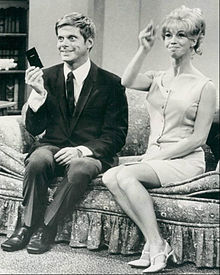
Paint Your Wagon is a Broadway musical comedy, with book and lyrics by Alan J. Lerner and music by Frederick Loewe. The story centers on a miner and his daughter and follows the lives and loves of the people in a mining camp in Gold Rush-era California. Popular songs from the show included "Wand'rin' Star", "I Talk to the Trees", and "They Call the Wind Maria".

Ethel Merman was an American actress and singer. Known for her distinctive, powerful voice, and her leading roles in musical theater, she has been called "the undisputed First Lady of the musical comedy stage." She performed on Broadway in Anything Goes, Annie Get Your Gun, Gypsy, and Hello, Dolly!
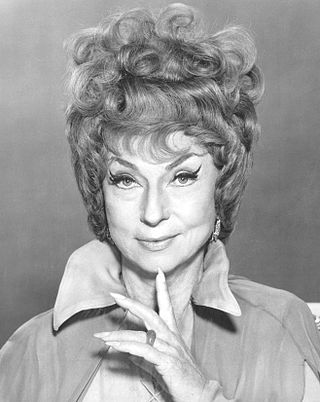
Agnes Robertson Moorehead was an American actress. In a career spanning five decades, her credits included work in radio, stage, film, and television. Moorehead was the recipient of such accolades as a Primetime Emmy Award and two Golden Globe Awards, in addition to nominations for four Academy Awards.
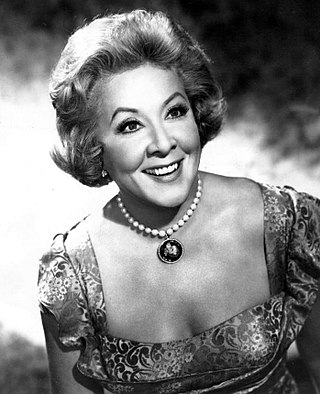
Vivian Vance was an American actress best known for playing Ethel Mertz on the sitcom I Love Lucy (1951–1957), for which she won the 1953 Primetime Emmy Award for Outstanding Supporting Actress, among other accolades. She also starred alongside Lucille Ball in The Lucy Show from 1962 until she left the series at the end of its third season in 1965. In 1991, she posthumously received a star on the Hollywood Walk of Fame. She is most commonly identified as Lucille Ball’s longtime comedic foil from 1951 until her death in 1979.
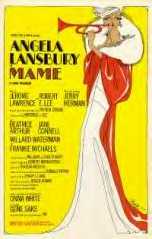
Mame is a musical with a book by Jerome Lawrence and Robert Edwin Lee and music and lyrics by Jerry Herman. Originally titled My Best Girl, it is based on the 1955 novel Auntie Mame by Patrick Dennis and the 1956 Broadway play of the same name by Lawrence and Lee. A period piece set in New York City and spanning the Great Depression and World War II, it focuses on eccentric bohemian Mame Dennis, whose famous motto is "Life is a banquet and most poor sons of bitches are starving to death." Her fabulous life with her wealthy friends is interrupted when the young son of her late brother arrives to live with her. They cope with the Depression in a series of adventures.

The Lucy Show is an American sitcom that aired on CBS from 1962 to 1968. It was Lucille Ball's follow-up to I Love Lucy. A significant change in cast and premise for the fourth season (1965–1966) divides the program into two distinct eras; aside from Ball, only Gale Gordon, who joined the program for its second season, remained. For the first three seasons, Vivian Vance was the co-star.

Panama Hattie is a 1940 American musical with music and lyrics by Cole Porter and book by Herbert Fields and B. G. DeSylva. The musical is about a nightclub owner, Hattie Maloney, who lives in the Panama Canal Zone and ends up dealing with both romantic and military intrigue. The title is a play on words, referring to the popular Panama hat.

Elaine Stritch was an American actress, known for her work on Broadway and later, television. She made her professional stage debut in 1944 and appeared in numerous stage plays, musicals, feature films and television series. Stritch was inducted into the American Theater Hall of Fame in 1995.

The Dean Martin Show is a TV variety-comedy series that ran from 1965 to 1974 for 264 episodes. It was broadcast by NBC and hosted by Dean Martin. The theme song to the series was his 1964 hit "Everybody Loves Somebody".

Robert Alan Morse was an American actor. Morse, known for his gap-toothed boyishness, started his career as a star on Broadway acting in musicals and plays before expanding into film and television. He earned numerous accolades including two Tony Awards, two Drama Desk Awards, a Primetime Emmy Award, and a Screen Actors Guild Award.

The Hollywood Palace was an hourlong American television variety show broadcast Saturday nights on ABC from January 4, 1964, to February 7, 1970. Titled The Saturday Night Hollywood Palace for its first few weeks, it began as a midseason replacement for The Jerry Lewis Show, another variety show, which lasted only three months.
"There's No Business Like Show Business" is an Irving Berlin song, written for the 1946 musical Annie Get Your Gun and orchestrated by Ted Royal. The song, a slightly tongue-in-cheek salute to the glamour and excitement of a life in show business, is sung in the musical by members of Buffalo Bill's Wild West Show in an attempt to persuade Annie Oakley to join the production. It is reprised three times in the musical.
"I Got Rhythm" is a piece composed by George Gershwin with lyrics by Ira Gershwin and published in 1930, which became a jazz standard. Its chord progression, known as the "rhythm changes", is the foundation for many other popular jazz tunes such as Charlie Parker's and Dizzy Gillespie's bebop standard "Anthropology ".
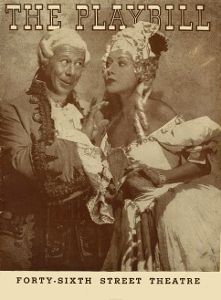
Du Barry Was a Lady is a Broadway musical, with music and lyrics by Cole Porter, and the book by Herbert Fields and Buddy DeSylva. The musical starred Bert Lahr, Ethel Merman and Betty Grable, and the song "Friendship" was one of the highlights. The musical was made into a 1943 Technicolor film Du Barry Was a Lady, starring Red Skelton, Lucille Ball, Gene Kelly and Tommy Dorsey and his orchestra.
"Anything You Can Do (I Can Do Better)" is a show tune composed by Irving Berlin for the 1946 Broadway musical Annie Get Your Gun. The song is a duet, with one male singer and one female singer attempting to outdo each other in increasingly complex tasks.
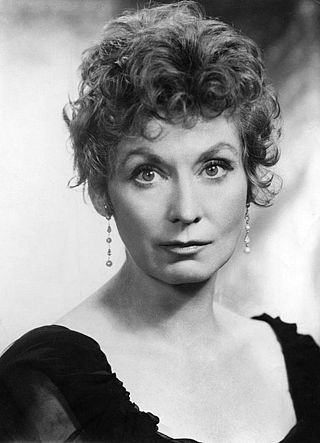
Margaret Kathleen Regan, better known as Kay Medford, was an American actress. For her performance as Rose Brice in the musical Funny Girl and the film adaptation of the same name, she was nominated for a Tony Award for Best Featured Actress in a Musical and an Academy Award for Best Supporting Actress respectively.
"Everything's Coming Up Roses" is a song with music by Jule Styne and lyrics by Stephen Sondheim, written initially for the 1959 Broadway musical Gypsy. Introduced in the show's inaugural production by Ethel Merman, "Everything's Coming Up Roses" became one of Merman's signature songs.

Red, Hot and Blue is a musical with music and lyrics by Cole Porter and a book by Howard Lindsay and Russel Crouse. It premiered on Broadway in 1936 and introduced the popular song "It's De-Lovely," sung by Ethel Merman and Bob Hope.

Happy Hunting is a 1956 musical with a book by Howard Lindsay and Russel Crouse, lyrics by Matt Dubey, music by Harold Karr, original choreography by Alex Romero, assistant choreographer Eugene Louis Faccuito (Luigi). The plot focuses on wealthy Philadelphia Main Line widow Liz Livingstone and her efforts to find a royal husband for her daughter Beth.

Judy's Scary Little Christmas is an original musical written by James Webber and David Church, with music and lyrics by Joe Patrick Ward. It is a spoof on television variety shows of the 1950s, satirizing celebrities’ public images and private lives. The fictional story employs a metaphysical plot twist and spiritual redemption through a ghost The show contains campy humor based on the sensationalized personal lives of the celebrities, with satirical references to pop culture and politics of the 1950s
